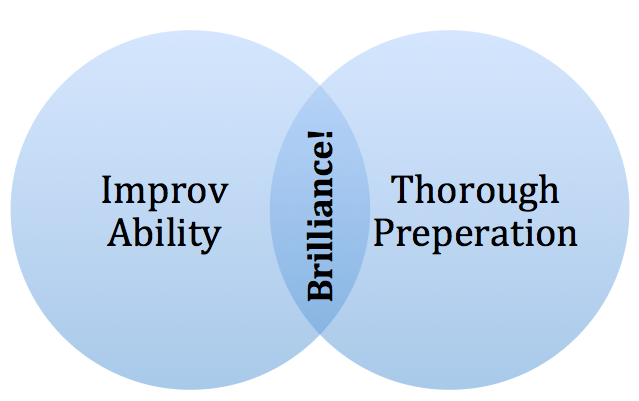Planning is important, but often it prepares you for the unexpected. A business plan is not Google Maps. It is not reality. It is an idea. Plan like crazy, then be open to what can happen. My friend Avish Parashar teaches improv comedy to business professionals, and he agrees with my idea of the being prepared, while being open to the unexpected.
Below is a blog post that appeared on Avish's blog that I thought might shed some light on this idea:
Tap Into your "Zone of Brilliance"
By Avish Parashar
Can I make a confession?
I am a paid professional speaker who speaks on the power of improvisation, and yet, my speeches are fairly well planned out when I speak!
Does that seem incongruent to you?
Would it make it worse if I told you that I practice my keynotes and that some of my stories are – gasp! – written out?
I can understand that feeling. However, it shouldn’t. Not if you understand a fundamental rule about improvising:
Improv is not about slacking off on the things you can control. It’s about letting go of the things you can’t.
I can control my speech, and I can control my content for the speech. When I speak, there are 2 levels of improvisation I use:
- I play improv comedy games in my speech. Those are new every time.
- I stay present and aware of my audience and adjust if and when necessary
Interestingly, the more prepared you are the easier it is to improvise!
I know my keynote and material so well that I don’t need to think about it. That frees up my conscious mind to be in the present and connect with the audience.
Then, when things go “not quite as planned,” (i.e. “Ding Happens!”) I am able to use improv skills to react and flow as if everything is just fine.
- Understand Why You Should Learn to Improvise - Don’t resist learning improv skills because you are very detail oriented and prefer to plan and prepare. Learn improv so that when something happens that you didn’t and couldn’t prepare for – and it will! – you will be able to quickly flow and deal with it.
- Get Over Your Fear Of Letting Others Improvise – If you are a manager or leader, you may find yourself saying, “I don’t want my people to improvise! I want them to do what they are supposed to, when they are supposed to, how they are supposed to.” No one is telling you otherwise, However, when taught and used properly, improv is not about letting people “wing it.” It’s about giving people the skills they need to react when the policy and system isn’t enough. (Here’s a tip: Google great customer service experiences. Almost every one is about an employee taking action outside of the “policy.”)
- Prepare! - I don’t care if you are a speaker, business owner, salesperson, customer service rep or other, there is no excuse for being unprepared! Know your material. Be an expert in your subject matter. Know your script/policy/system cold. THEN you will be in an amazing position to improvise when needed.
So yes, I am an improviser who prepares. And if you want to be a rockstar in your job, career, or industry, then I highly suggest you become one too!
Do you want to unleash the brilliance that comes at the intersection of improvisation and preparation in your team or organization? Then contact Avish now to find out how he can help you do just that!
More info on Avish at http://www.avishparashar.com/bio.html
Have A Great Day
thom singer


No comments:
Post a Comment